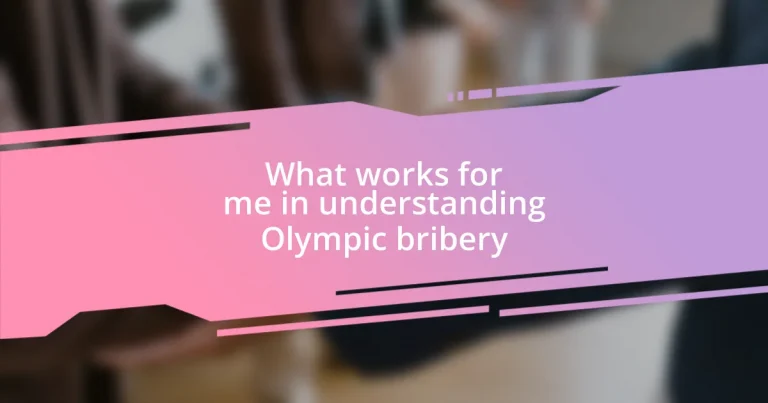Key takeaways:
- The Salt Lake City 2002 scandal highlighted the issue of IOC members accepting gifts for votes, prompting investigations and reforms.
- Allegations of luxury gifts during the Beijing 2008 bidding process and bribery claims in the Rio 2016 Games further exposed systemic corruption within the Olympic framework.
- To combat bribery, implementing strict ethical guidelines, empowering stakeholders through education, and creating safe whistleblowing channels are essential strategies for restoring integrity in the Olympics.
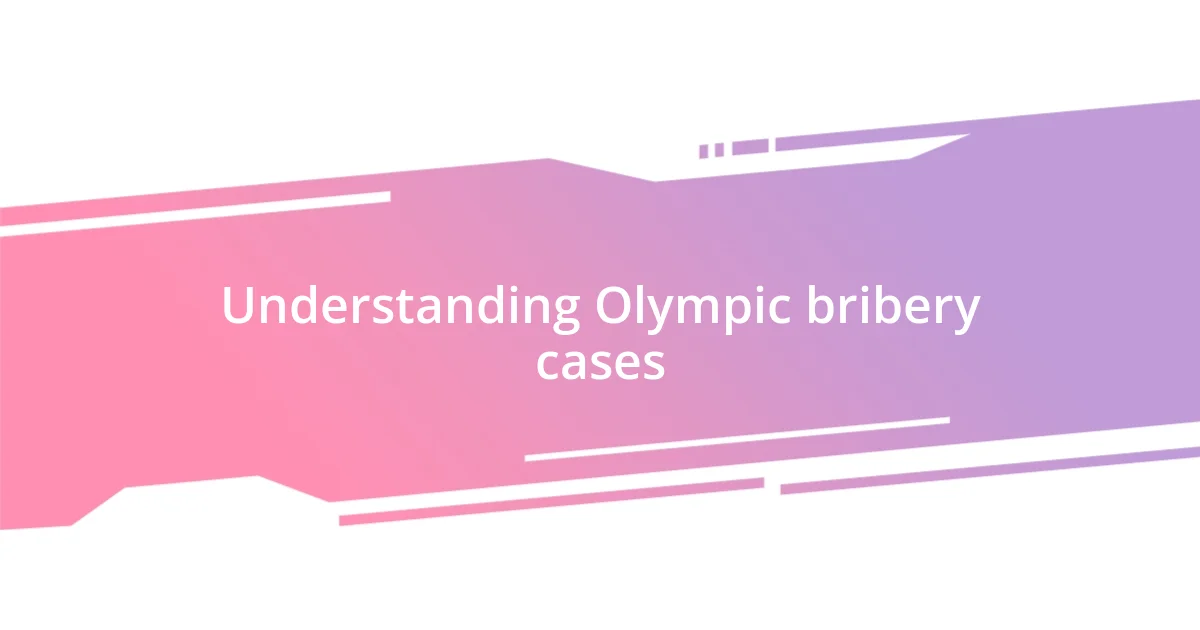
Understanding Olympic bribery cases
Olympic bribery cases often reveal the darker side of what is supposed to be a celebration of sportsmanship and fairness. I remember feeling disillusioned when I first learned how hosts could buy the Games instead of earning them through merit. How can an event centered around unity and competition allow such corruption to thrive?
When delving into specific cases, like the Salt Lake City scandal in 2002, it’s shocking to see how several International Olympic Committee (IOC) members received gifts in exchange for their votes. It might make you wonder, what does it say about the integrity of the decision-making process? Personally, that situation has always haunted me; it felt like a betrayal of athletes who work tirelessly for their dreams.
As I explored various incidents, I noticed a pattern: large sums of money routinely change hands behind closed doors. This raises an important question—what safeguards are in place to prevent future bribery? In my view, transparency is essential to restoring faith in the Olympics, allowing the focus to return to the spirit of the Games rather than hidden agendas.
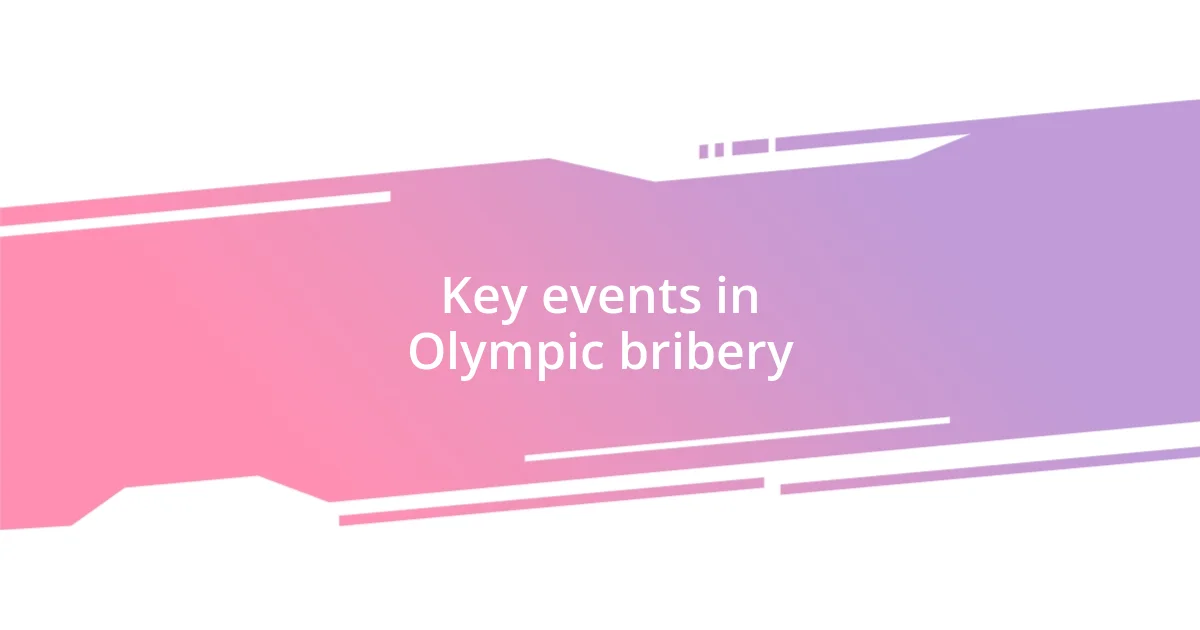
Key events in Olympic bribery
When reflecting on the bidding for the 2008 Beijing Olympics, I began to grasp the extent of Olympic bribery. Reports surfaced indicating that some IOC members were offered luxurious benefits to influence their votes. Each revelation felt like another layer of deception peeled back, exposing a world where prestige could be bought.
The 2016 Rio de Janeiro Games also uncovered a tangled web of bribery. Allegations emerged that members of the Brazilian Olympic Committee used their positions to secure votes in favor of hosting the event. I often find myself questioning how many opportunities for genuine celebration were overshadowed by such ethical breaches.
Looking back at these events, I can’t help but feel a mix of anger and sadness. It’s alarming to think that many athletes train their whole lives for a chance to compete fairly, only to have that dream tainted by corporate greed and corrupt practices. This perspective has made me a passionate advocate for reform; if we want the Olympics to reflect true sportsmanship, addressing bribery must be a top priority.
| Event | Details |
|---|---|
| Salt Lake City 2002 | IOC members received gifts for votes, leading to investigations and reforms. |
| Beijing 2008 | Allegations of luxury gifts to influence bidding outcomes. |
| Rio 2016 | Bribery claims involving Brazilian officials securing votes. |
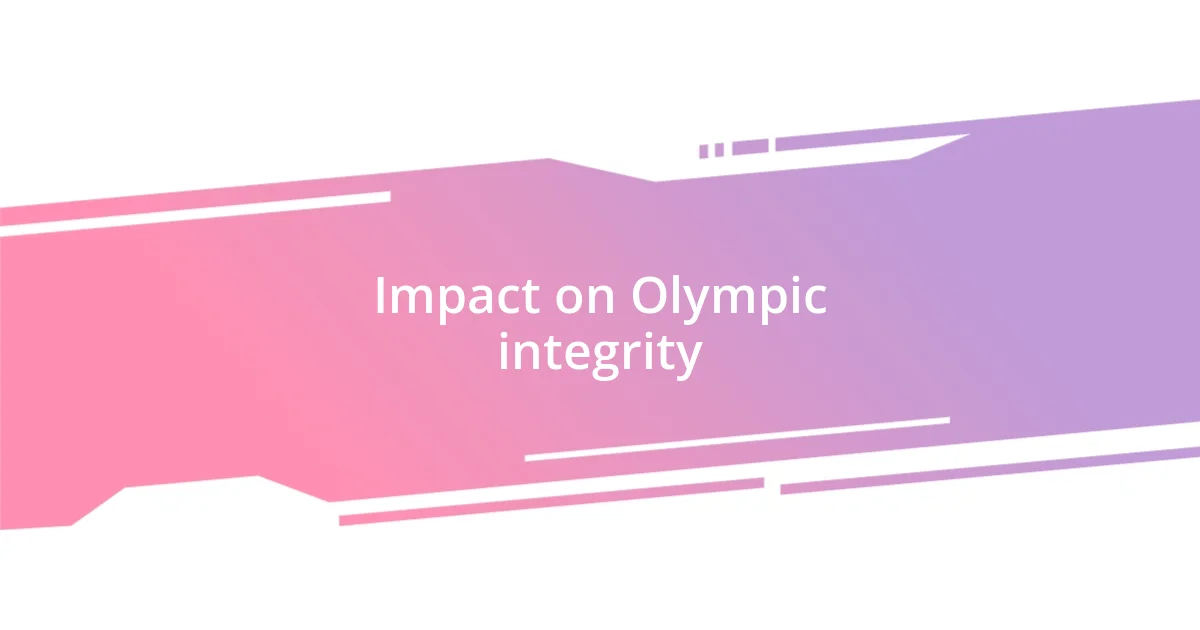
Impact on Olympic integrity
It’s truly unsettling when I think about the impact of bribery on the Olympic Games’ integrity. The essence of the Olympics is supposed to be about fairness, athletic prowess, and unity among nations. Yet, when money taints the decision-making processes, those core values become questionable. I often wonder how an athlete must feel, training for years, only to compete in an environment fraught with hidden agendas and corruption. It’s disheartening, to say the least.
- Bribery undermines the fairness of competition, casting doubt on the legitimacy of winners.
- It erodes public trust in the Olympic movement, making fans skeptical of the Games.
- The reputation of the IOC and its governance is compromised, necessitating urgent reforms.
The ramifications extend beyond just the immediate scandal; they ripple out into the entire Olympic framework. For instance, when I think about young athletes who view the Games as the pinnacle of their dreams, it pains me to consider that their hard work can be overshadowed by unethical practices. I wish I could tell them that their efforts lead to a fair and just platform, but how can I when the very foundation is cracking? This ongoing struggle for integrity within the Olympics continues to grip my thoughts, pushing me to advocate for a brighter future.

Evaluating historical bribery examples
When I delve into historical bribery examples, I often think of the Salt Lake City Olympics in 2002. The scandal erupted when it was revealed that IOC members received lavish gifts to sway their votes. It’s hard to shake the feeling of betrayal knowing that the very people entrusted to uphold the integrity of the Games were swayed by material temptation. I sometimes wonder if those gifts overshadowed the true spirit of competition for those athletes who poured their hearts into their training.
The bribery surrounding the 2008 Beijing Olympics takes me to a different level of introspection. Luxury gifts were allegedly offered to several IOC members to influence the bidding process. Imagine the athletes, brimming with hope, knowing that their dreams rested not only on their talent but also on the murky waters of ethical breaches. I can’t help but feel conflicted; how can we celebrate achievements when the foundations are built on questionable practices?
Reflecting on the 2016 Rio Games, it’s troubling to see how corruption penetrated the core of the event. Allegations arose that Brazilian Olympic officials manipulated their positions for a favorable outcome. This makes me think about balance; in how many moments is victory truly earned versus bought? It’s this lack of clarity that stirs frustration, reminding me that every time the integrity of the Games is compromised, it’s not just a blemish on the event but a disservice to every aspiring athlete who dreams of competing on the world stage.
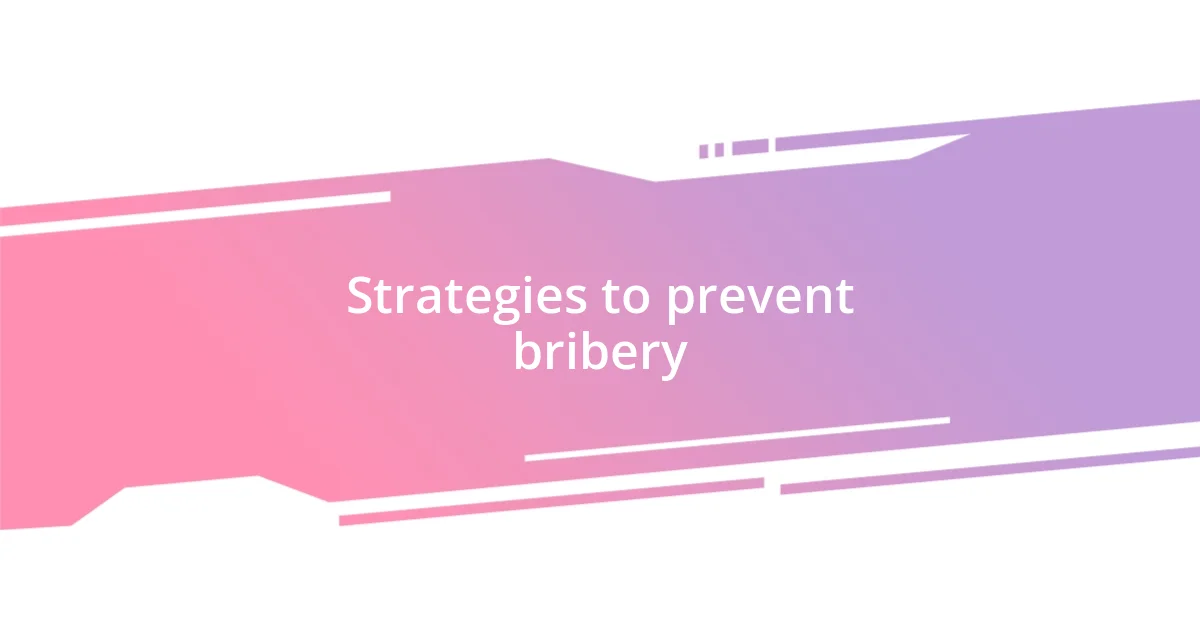
Strategies to prevent bribery
To prevent bribery in Olympic bidding and management processes, implementing strict ethical guidelines is crucial. I’ve often found that when organizations establish clear rules, it sets a tone of accountability. Can you imagine an environment where every decision is transparent? That’s the kind of integrity we should aim for.
Training and empowering stakeholders in ethical decision-making is equally important. I’ve seen firsthand how workshops and seminars can genuinely change perspectives. When individuals understand the repercussions of bribery, they’re more likely to resist temptations. Isn’t it fascinating how education can foster a culture of integrity?
Lastly, fostering an environment that encourages whistleblowing is vital. I remember a time when someone within an organization bravely reported dubious activities, leading to significant reforms. If we create safe channels for individuals to speak up, we might just uncover hidden issues before they escalate. Shouldn’t we aspire to a system where honesty is not just rewarded but celebrated?
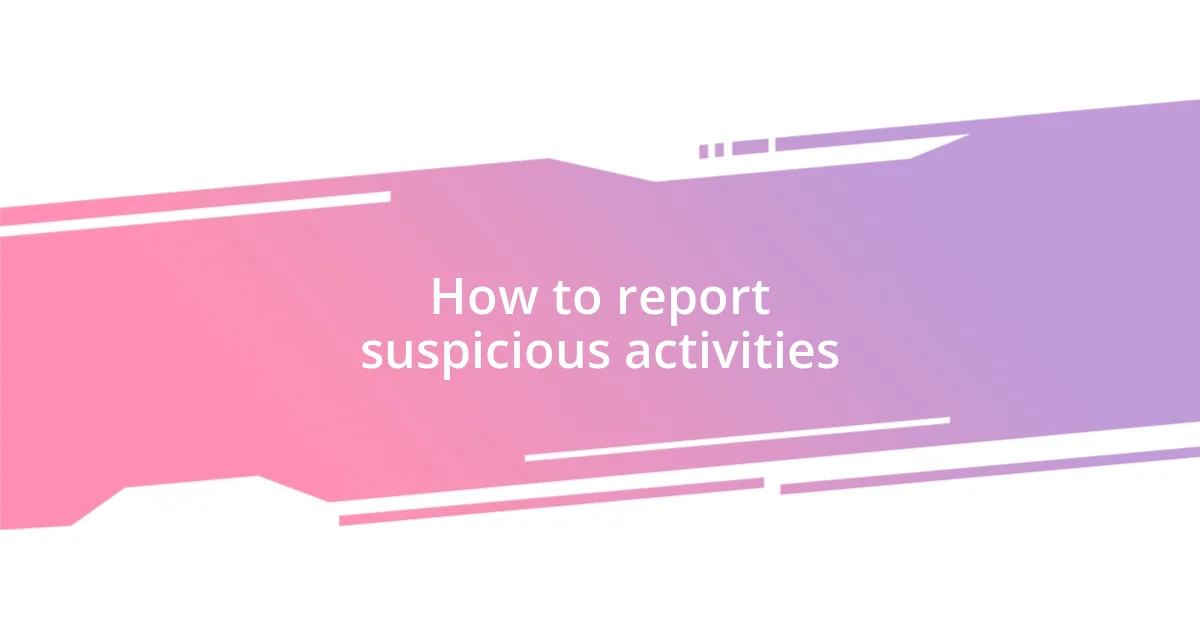
How to report suspicious activities
When you notice something suspicious, whether it’s unusual transactions or seemingly unmerited favoritism, it’s important to report it effectively. I remember a time when I stumbled upon irregularities in a local sports organization. It felt daunting to bring it up, but I quickly realized the significance of transparency. If you find yourself in a similar situation, consider contacting the appropriate authorities, like a governing body, or even using anonymous hotlines that many organizations provide.
Using specific details when reporting can make all the difference. Documenting dates, times, and the nature of suspicious activities can enrich your report and help investigators take action more swiftly. I once assisted a friend who reported misconduct at a small event, and we meticulously laid out our observations. The clarity of our details made the process smoother and emphasized the credibility of the claims. Doesn’t it feel empowering to know that effective reporting can spark meaningful change?
Remember, reporting isn’t just about pointing fingers; it’s about protecting the integrity of the sport. I’ve experienced firsthand the weight of silence over wrongdoing, and it gnawed at my conscience. When we stand up against unethical practices, we contribute to a culture where fairness reigns. Why let fear stifle your voice when doing the right thing could encourage others to do the same?












